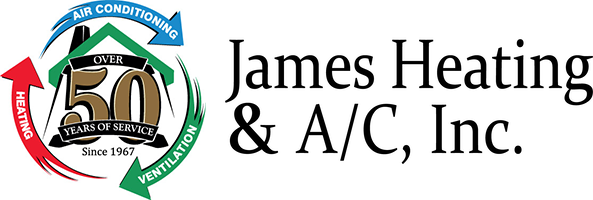
To combat increasing energy expenses and embrace sustainability, many homeowners are trying new methods to maintain comfort levels while using less energy. As part of the Inflation Reduction Act, federal tax credits are available for energy-efficient home upgrades, especially HVAC systems like air conditioners. These credits offer big savings, as long as the homeowners use qualifying equipment and submit the appropriate form.
If you’re concerned the application process might be tedious, maybe we can help! James Heating & A/C, Inc hopes this guide will give you everything you need to earn these HVAC tax credits in 2024. Here’s how.
Understanding the HVAC Tax Credits
These valuable tax credits for boosting your home’s energy efficiency are just one intended use of the recent Inflation Reduction Act. Energy costs affect everyone, so helping homeowners upgrade to higher efficiency utilities can benefit everyone. The key provision of these credits is to mitigate costs associated with installation and renovation projects. Of particular importance are the Energy Efficiency Home Improvement Credit and the Residential Clean Energy Credit.
However, to earn any of the credits, you’ll need to fill out IRS Form 5695. Additionally, this form needs to be submitted within the same tax year any upgrades were installed, not bought.
Energy Efficiency Home Improvement Credit
Through 2032, the Energy Efficiency Home Improvement credit empowers homeowners by offsetting up to $3,200 each year for making your home more energy-efficient. This equals 30% of the total project’s cost. Keep in mind that in order to be eligible for the maximum amount, it involves making different investments. For example, you’ll save up to $2,000 for installing a higher efficiency heat pump. This can be combined with the remaining $1,200 in credits for other eligible upgrades made within the tax year.
While new heat pump systems are a key target for this incentive, high-efficiency furnaces, air conditioners, boilers, and other HVAC systems are still eligible for this tax credit. You should confirm the make and model’s energy efficiency rating is high enough for eligibility.
Exploring the Residential Clean Energy Credit
The Residential Clean Energy Credit offers 30% savings on a variety of residential clean energy equipment upgrades. Eligibility is restricted to homeowners looking for new clean energy solutions for their home. While the Home Improvement Credit works primarily with utilities and HVAC systems, this credit targets renewable energy sources like solar and wind energy.
Some specific items in this tax credit include the requirement that installation must occur between 2022 and 2032. But at the same time, homeowners can use any excess credit to reduce taxes in future years. This is a great way to spread out costs and keep them more manageable.
Additional Qualifications for Energy Tax Credits
Because HVAC systems are one of the major reasons for high energy bills, these tax credits incentivize the most energy-efficient options. But home energy efficiency can be improved in lots of other ways. Apart from the previously listed HVAC upgrades, {you could also choose|other eligible items include|you also have access to:
- Energy-saving heat pump water heating systems
- Electrical panel upgrades
- Upgraded electrical wiring
- Insulation, air sealing and ventilation enhancements
- Energy-efficient cooking appliances like stoves, cooktops, and ovens
- Heat pump clothes dryers
- High-efficiency water boilers
Like the HVAC systems, you’ll need to confirm that your chosen products meet the required energy efficiency ratings.
Three Tips for Making the Most of 2024 HVAC Tax Credits
While any one of those upgrades can boost home energy efficiency, a little planning will ensure they offer the most long-term benefits. Get the most from your HVAC tax credits with the following three tips:
- Conduct a home energy audit to identify impactful upgrades. Trust experienced HVAC companies to pinpoint essential products and services.
- Improve your home's thermal efficiency with better windows and doors.
- Explore potential rebates from utility companies for clean energy upgrades. Renewable sources like solar, wind, and geothermal contribute to community power grid sustainability.
- Remember to consider financing plans offered by service providers.
James Heating & A/C, Inc Can Help You Secure HVAC Credits for 2024
Partner with local HVAC professionals like James Heating & A/C, Inc for eligible serves like energy assessments or new installation. Our helpful installers will deliver everything you need for home energy efficiency upgrades.

